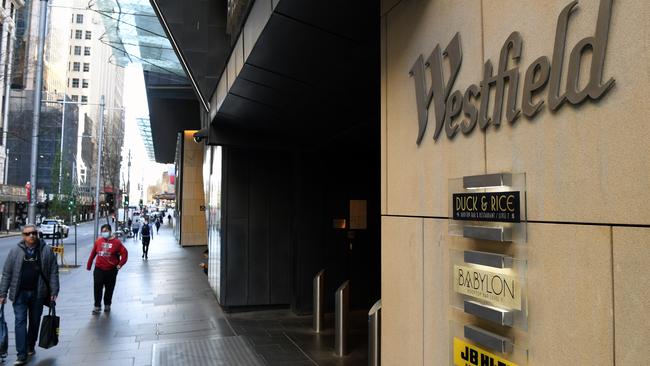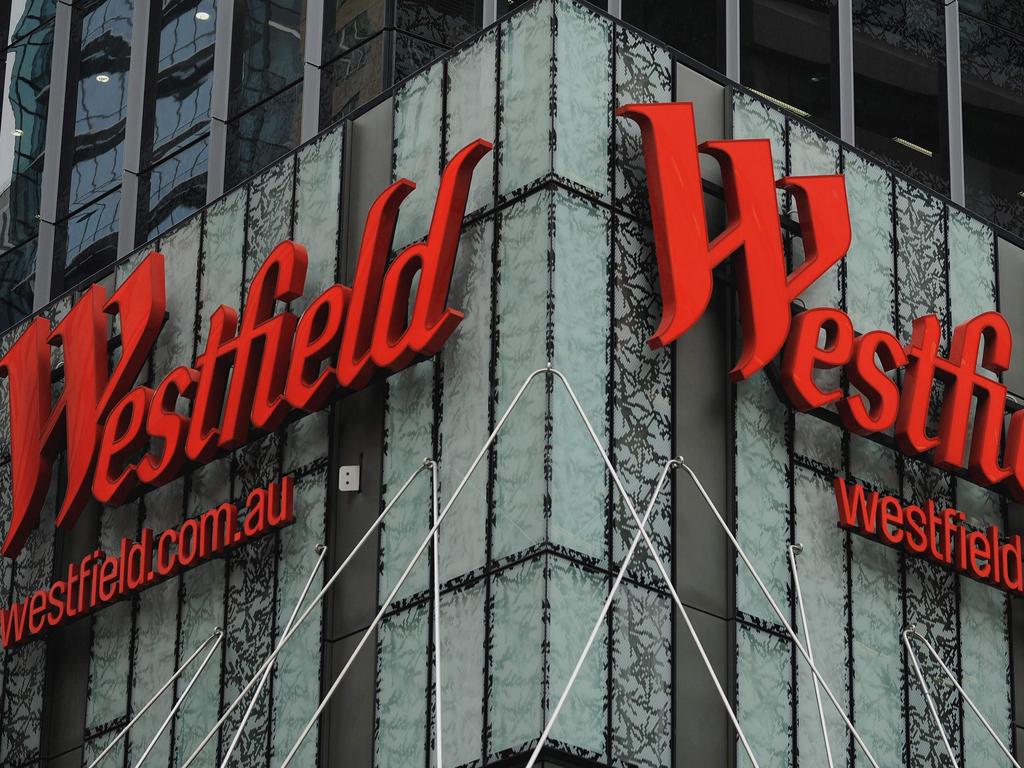Westfield mall owner Scentre sinks to $3.6bn first half loss
Scentre’s dive to a loss comes after COVID-19 turned its malls into ghost towns, forcing a $4bn hit to property values.

The battle between shopping centre landlords and retailers is entering a new and potentially more dangerous phase as the nation’s largest listed retail property company signals it will take a tough line on larger chains refusing to pay rent.
Scentre Group, led by veteran chief Peter Allen, has laid down the law to tenants, with the operator of the powerful Westfield shopping centre empire calling out retailers that refuse to pay rent while they collect the JobKeeper subsidy and trade profitably.
The landlord, which last week locked out fashion chain Mosaic Brands, is at the vanguard of a movement to ensure the commercial property industry does not bear a disproportionate cost during the pandemic.
Scentre chief executive Mr Allen refused to comment about “individual arrangements”, but the mall owner effectively brought the dispute to a public head by boarding up Mosaic outlets.
The shopping centre giant’s half-year results released on Tuesday also indicated the strain on that industry as it crashed to a $3.6bn loss, although the company’s shares rallied by 4.5 per cent as investors were relieved it ruled out an equity raising to recapitalise its balance sheet.
The fight between Scentre and Mosaic has rippled across the retail property industry, putting rival fashion brands on alert that their landlords could act against them and forcing other landlords to review their own retail leasing books.
Scentre is also taking a staunch position against an open-ended extension of the Morrison government’s leasing code, which protects small tenants, without significant revisions that would exclude some larger beneficiaries.
Mr Allen called the Morrison code clunky and said it was not necessarily meeting the “real needs” of those small retailers “who really deserve it”.
Instead Scentre, which operates more than 40 malls, wants to cut back the definition of a small business from $50m to just $5m to qualify for rental relief.
Landlords are also pressing for rights to enforce deals via evictions if necessary to get the industry back on track.
“There needs to be a quid pro quo in that regard,” Mr Allen said.
The group has been at loggerheads with retailers that are formally outside the scope of the code but have taken the JobKeeper subsidy and are trading profitably, with Solomon Lew’s Premier Investments leading the charge not to pay rent when the pandemic closed it stores.
Mr Allen drew a sharp contrast between Westfield, which did not collect JobKeeper, and major retailers — including Premier Investments, Myer, Adairs and Mosaic Group — that had turned to the scheme.
“Our view was, being profitable, the right thing to do from a moral point of view is to be able to allow that funding to be supporting those people who really need it,” he said.
The Westfield operator was clear it would seek to enforce leases, with Mr Allen saying it was differentiating between smaller struggling small retailers and profitable chains that could access capital.
Scentre is insisting that tenants stick to fixed-rate lease structures, despite retailers including Premier pushing for deals that reflect a percentage of sales and arguing these have become widespread across the industry.
The attempted change has been rejected by Scentre, which claims that switching to this kind of structure would undermine the foundations of the shopping centre industry and force landlords to take on business risks that they and their investors are unwilling to bear.
The result and accompanying rhetoric from Mr Allen, who also heads the Shopping Centre Council of Australia, indicate a hardening of the stance of many landlords, as the pandemic continues. They are unhappy as their initial voluntary support for tenants was made mandatory in a code many view as undercutting their rights and longer-term viability.
Scentre and rival landlords are keen for more chains to start paying full rent months after the pandemic has been contained in much of Australia, and as normal trading picks up in Sydney they want to ensure a solid system is in place for when Victoria reopens.

The pandemic has already permanently wiped billions of dollars off shopping centre portfolios as the once lucrative complexes face increasing structural headwinds from e-commerce, anchor department stores totter and weak discretionary spending as the nation heads into a deep recession.
Scentre’s first-half loss was weighed down by heavy writedowns on its mall portfolio and marked a sharp decline from its net profit of $740m at the same stage of the previous year. In all, Scentre took a $4.08bn hit on property valuations.
The heavy loss comes as the coronavirus pandemic keeps many shoppers from visiting its malls, including during the more recent impact of Melbourne’s lockdown, which will be reflected in this half’s results.
Scentre said in the first half it generated operating earnings of $361m and funds from operations of $362m. The company also took an expected credit charge of $232m related to the financial impact of the COVID-19 pandemic.
In the virus-hit first half the group collected 70 per cent of gross rental billings. For the months of June and July, gross rental buildings recovered to more than 80 per cent.
The company is making progress in collecting rent owed during lockdowns and said it has made agreements with 2438 of its 3600 retailers, including 1620 for small businesses.
The impact of the pandemic risks stretching Scentre’s balance sheet, despite $4.4bn of available liquidity at the end of June. Many analysts had considered the company’s finances to be stretched even before the pandemic and had urged the sale of some assets, which may now be hard to do given clouds over the retail sector.
Scentre said its gearing was 38.4 per cent at the end of June. Moody’s Investors Service said the results were a credit negative and highlighted the challenging environment for retail landlords, with materially lower earnings, weaker rent collections and substantial expected credit charges.
The results show operating earnings translated to 6.94c per security and funds from operations were 6.96c per security.
Scentre confirmed it wouldn’t provide earnings or distribution guidance, but Mr Allen said the company had adapted to the significant changes brought about by the COVID-19 pandemic.







To join the conversation, please log in. Don't have an account? Register
Join the conversation, you are commenting as Logout